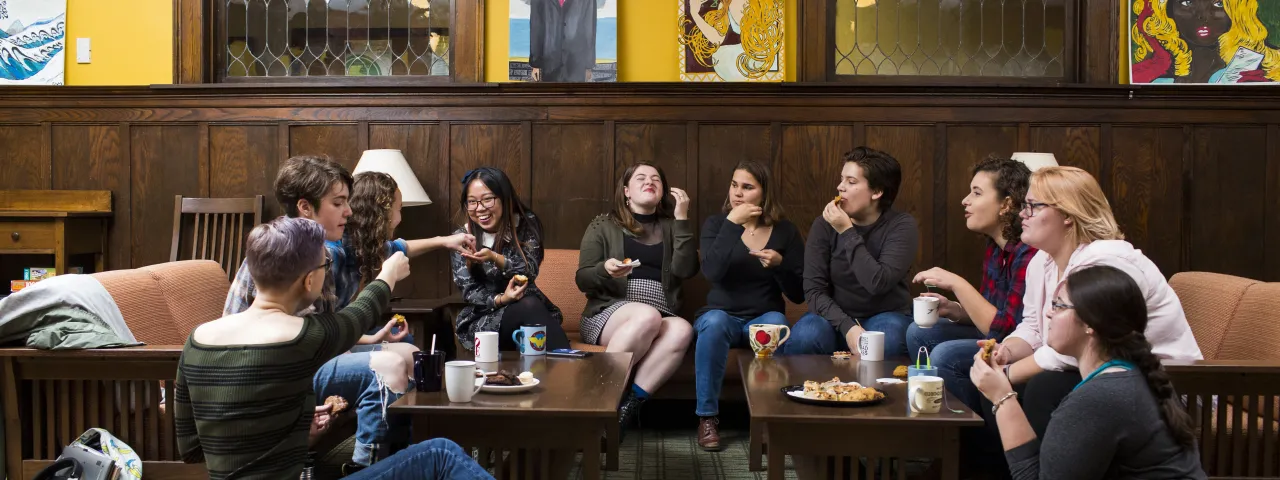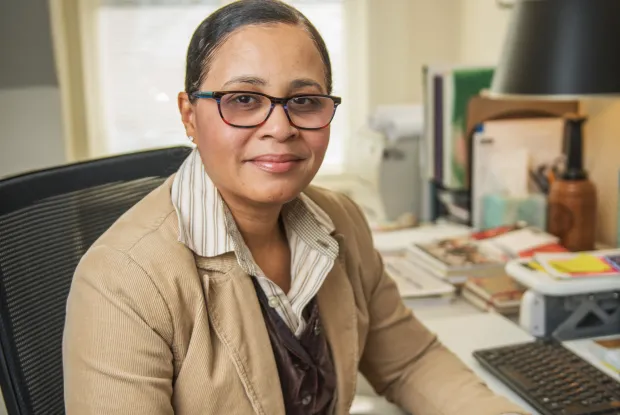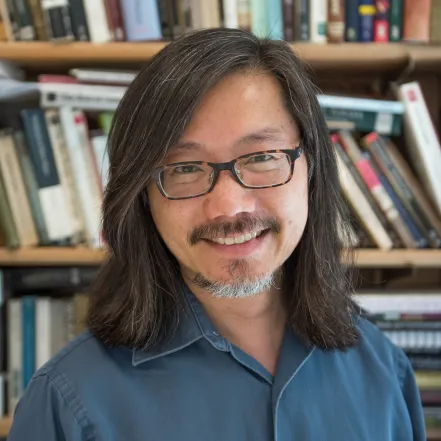The Center for Religious & Spiritual Life hosts spaces for student activities, such as prayer, religious services, group meetings, performances and for simply hanging out. Most of these spaces are located in Helen Hills Hills Chapel, but others may be found around campus.
Helen Hills Hills Chapel Sanctuary
The Sanctuary is a holy and sacred space where religious observances from many different faith traditions are held. Through the use of its resources such as a flexible floor plan, AV system, and wonderful acoustics, students have found the Sanctuary to be a welcoming space that supports their rituals, performances, and practices. Cultural celebrations and beloved Smith traditions such as Baccalaureate and Pet A Pet Day occur in the space, as do meditations and mindfulness programs.
Bodman Lounge
Located in the chapel’s lower level, Bodman Lounge has couches, Wi-Fi, a library of religious texts and a Zoom Room system. We encourage informal use of the space without a reservation, but students, faculty, and staff can reserve the space for events. The space accommodates 25 people, and can be accessed by a flight of stairs or the elevator at the rear of the building. Bodman is a true interfaith space and there are representations, including a library, of varied religions, spiritual and wisdom traditions.
Chapel Kitchen
The kitchen is located in the lower level of the chapel. It has been recently updated, and is conveniently connected to Bodman Lounge. The CRSL team is excited to use this space when hosting such programs as Soup, Salad, and Soul, Interfaith Lunch, and Spirituali-Tea. The kitchen is not available for reservation.
Reflect, Resist, Rejuvenate Lounge
The RRR Lounge is a contemplative waiting area and a meditation room, for anyone of any tradition. We welcome anyone to meditate on a cushion or sit quietly on a couch, journal, sketch, read poetry or a sacred text or any literature that is contemplative for you. We ask that this room be free from social media use, and that technology use be limited. If you need to work on a computer, we warmly welcome you to any other space in the building that is available. To reserve under specific circumstances, fill out a reservation form.
Blue Room
The Blue Room is a non-reservable quiet space on the lower level of the Helen Hills Hills Chapel for contemplative practice, prayer or meditation. Resources in the Blue Room include religious texts, prayer rugs, meditation pillows, chimes, and candles, and the cardinal directions are marked on the walls. The Blue Room is a sacred space. Anyone using the space is asked to remove their shoes and only use it for activities that align with the space’s purpose. No food or drink is permitted in this space. Groups may use the room, but louder or larger group meetings are asked to please reserve a different space, such as the Bodman Lounge.
Hindu Mandir
The chapel houses a mobile Hindu prayer space currently located in the Reflect, Resist and Rejuvenate Lounge, lower level of the chapel. Equipped with images, incense, and religious texts, it is a place for Hindu worship and prayer.
Wright Hall Prayer Space
The Wright Hall Prayer Space, featured above and to the left, is located in Wright 004 and is a non-reservable quiet, contemplative space for anyone in the Smith community to pray, reflect or meditate. Resources include religious texts and prayer rugs, candles, and the cardinal directions are marked on the wall. This space is meant as a space of solace and is not intended for group meetings. If you would like to use this space, please contact Maureen Raucher or Kim Alston for access.
If you would like to use this space, please contact Maureen Raucher or Kim Alston for access or questions about using the space.
Kosher Kitchen
The kosher community kitchen (warmly referred to as the "K"), is located at Jordan House and is under the direction of Dining Services and the Rabbi/Jewish student advisor via the Center for Religious and Spiritual Life (CRSL) The “K” is the main location for the Friday Night Shabbat Services sponsored by the Smith College Jewish Community Org (SCJC) in collaboration with the CRSL. It is centered around Jewish tradition and community, and Rabbi Noam will occasionally hold individual or small group sessions there. On Fridays it is usual to find the space teeming with choppers, would-be chefs, dishwashers, and others prepping for Shabbat. During the academic year, some special holiday events, and other occasional Jewish programming activities are held at the K.




